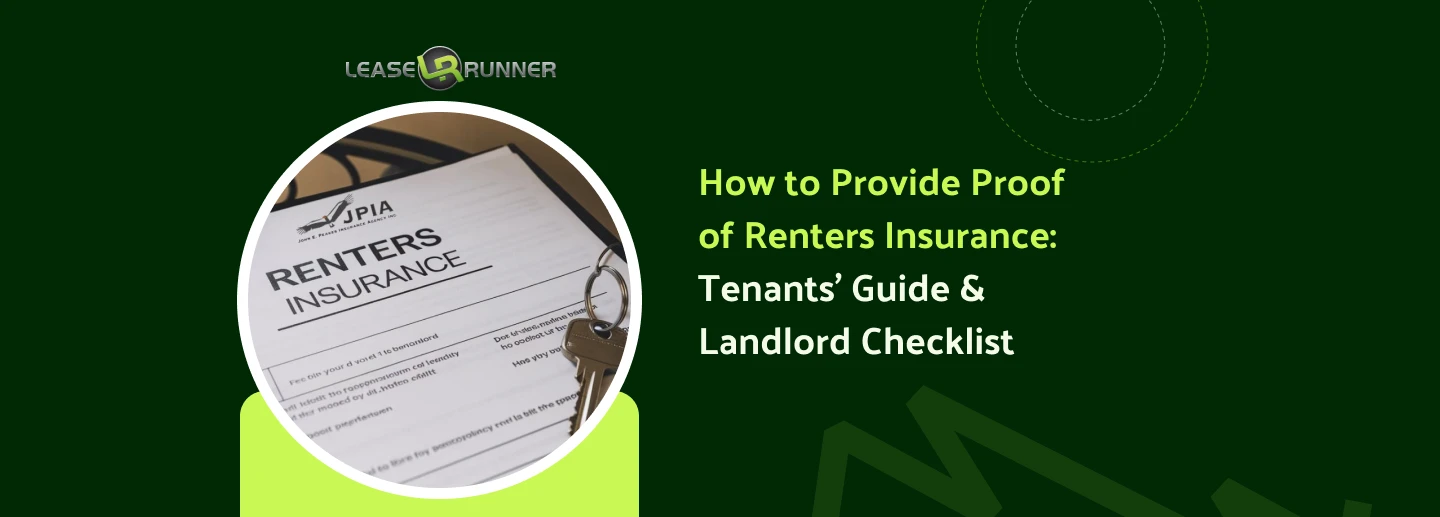What renters' insurance covers is something every landlord must know. If a fire destroys a tenant’s couch, their personal property coverage in renters' insurance pays for a new one. If a thief steals a laptop, the tenant’s policy helps, not you. If a guest gets hurt, the tenant’s renters' insurance coverage can pay medical bills.
Requiring renters' insurance is smart. Add it to your lease. Ask for proof. Use LeaseRunner to track it. This guide shows what renters' insurance is good for, what it does not cover, and how renters' insurance can cover certain natural disasters. You will see clear examples, key steps, and tips to protect your rental business right below. Let's check!

Key Takeaway Table
What is Renters Insurance? What Is it Good For?
Renters' insurance is a policy that renters buy to secure their belongings and cover their responsibilities in a leased house.
What is renters' insurance useful for?
- Protecting renters' things: If a fire, theft, or vandalism happens, tenants may get new things without having to ask you for money.
- Insurance protection: If a visitor gets hurt in the rental or the renter accidentally damages another apartment, insurance coverage comes in.
- Covering extra living costs: If the property is no longer livable, renters' interim accommodation and food are paid for.
- Less arguing: Clear coverage implies there will be fewer debates over who is to blame after a defeat.
- Lessening your risk: If your renters carry insurance, you are less likely to have claims on your landlord policy.
Personal property coverage is the most important part of renters' insurance. It prevents tenants from coming to you for money after a loss. Renters' insurance does more than only safeguard tenants; it also protects your company and your image.
Why is it important for landlords?
For landlords, the landlord insurance protects the premises, but not the tenant's possessions or their responsibility. That's when renters' insurance comes in to cover the possible risks, reducing the risk of the landlord having to file a claim on their policy.
How Much Does Renters' Insurance Typically Cost? Who Pays For It?
Knowing how much renters' insurance costs will help you establish realistic expectations for tenants and explain why you have certain lease terms.
Standard Cost and Who Pays
Renters' insurance costs between $15 and $25 a month, or $180 and $300 a year, on average in the U.S. Most renters can pay this tiny investment for peace of mind.
Then, who is responsible for renters' insurance? Tenants must buy and maintain their own insurance coverage. As a landlord, you may make it a condition of the lease that the tenant provide evidence of insurance.
Factors Affecting Cost
- Location: Areas that are more likely to suffer natural catastrophes, including hurricanes, wildfires, or floods, pay higher rates.
- limitations on coverage: Higher limitations for personal property or liabilities raise the price.
- Deductible: A greater deductible means a cheaper monthly premium.
- History of claims: Tenants who have made claims in the past may have to pay extra.
- Extra coverage: Riders for jewels, gadgets, or certain risks cost more.
Example of a renters' insurance policy
A typical renters' insurance policy example might look like this:
- $30,000 in coverage for personal property
- $100,000 in liability coverage
- $5,000 in lost usage (extra living costs)
- $1,000 in medical payments to other people
- $500 deductible
Encourage your tenants to look at their alternatives and acquire a renters' insurance quote from their insurance provider or LeaseRunner for low prices and simple monitoring of their compliance.

Key Types of Coverage Under Renters Insurance
There is no one-size-fits-all renters' insurance. You can teach your renters and make sure everyone is safe by knowing the different forms of coverage.
1. Personal Property Coverage
Personal property coverage, renters' insurance, is the core of any policy. It protects tenants’ belongings from risks like fire, theft, vandalism, and certain types of water damage.
- Does renters' insurance pay for stolen items? Yes, most plans cover theft, whether it occurs in the rental or while you're away.
- Does renters' insurance cover damage from water? Yes, but only if it was caused by something unexpected, like a broken pipe. Not by floods or slow leaks.
- Does renters' insurance cover fires that start in the woods? Yes, provided the insurance lists wildfire as a risk.
- Does renters' insurance cover money? Limited; most plans only pay back a small amount of cash (usually between $200 and $500).
Encourage your renters to make a list of their things and choose coverage limits that reflect how much their things are worth.
2. Liability Coverage
Liability coverage protects renters if they are judged to be legally accountable for hurting someone or damaging their property. Here are several examples:
- A visitor trips and falls in the rental.
- A neighbour's dog attacks a tenant's dog.
- A renter unintentionally sets fire to another flat, causing damage.
This insurance compensates for medical expenses, damages, and legal fees, which lowers the chances that you will be held responsible for things that happen to tenants.
3. Loss of Use (Additional Living Expenses)
If a covered event (like fire or severe water damage) makes the rental uninhabitable, loss of use coverage pays for:
- Hotel stays
- Meals
- Transportation
- Other necessary living expenses
This helps tenants relocate quickly and reduces pressure on you to provide accommodations.
4. Medical Payments to Others
This covers little medical costs if someone is hurt on the property, no matter who is to blame. It's a kind thing to do that can stop litigation and make little problems go away.
Key Scenarios Where Renters' Insurance Can Cover
Let’s explore real-world scenarios where what renters' insurance covers becomes essential for both tenants and landlords:

Theft or Damage
Renters' insurance pays for stolen or damaged property, which lowers the number of claims and disputes against your policy.
- Does renters' insurance cover stolen items? Yes, inside and outside the rental.
- Is vandalism covered by renters' insurance? Yes, vandalism is usually covered by most insurance.
Damage from fire and water
Renters' insurance protects personal belongings and, in certain situations, temporary accommodation, whether there is a fire in the kitchen or a pipe break.
- Does renters' insurance protect against wildfires? Yes, if wildfire is listed as a risk.
- Does renters' insurance cover damage from water? Yes, but only if it was abrupt and not planned (not flooded).
Hurricane or natural disaster damage
Tenants are safe if the insurance covers these risks. Floods and earthquakes are typically not covered by standard plans, so you may require extra coverage.
Injuries Inside the Rental
Liability and medical payments coverage assist in compensating for accidents to guests, safeguard renters, and lower your risk of being sued.
Loss of Use if the Property Can't Be Lived In
Renters' insurance pays for hotel bills and living costs, so renters won't be left without somewhere to stay, and you won't have to pay for anything.

What Renters Insurance Doesn’t Cover: Exclusions to Know?
There are a lot of things that renters' insurance covers and doesn't cover; however, there are several crucial things that landlords and tenants need to know:
- Floods and earthquakes are usually not covered and need their own insurance.
- Damage to the structure: Your landlord insurance covers the building, not your renters' insurance.
- Damage done on purpose or breaking the law: If a renter destroys the property on purpose or breaches the law, insurance won't cover it.
- Damage from bed bugs, mice, or termites is not covered.
- Property of roommates: Only the property of the designated insured is protected. Roommates are not covered unless they are expressly identified.
- Standard policies restrict the amount of jewellery, art, or collectables that may be covered. Tenants might think about getting riders for added protection.
Pro Tip: If renters are in this situation, tell them to get extra insurance (such as flood or earthquake insurance) or riders for their most valuable possessions. As a landlord, make sure your lease is clear about these gaps and provide renters the tools they need to be safe.
How Landlords Can Ensure Tenants Have Adequate Coverage
If you make sure your renters have the correct rental insurance for the residence, you preserve your investment and lower your risk. Here is how to make it work:
Lease Requirements
Add a condition to your lease that says tenants must have renters' insurance with a minimum amount of coverage, such as $100,000 in liability and adequate coverage for their personal property.
Proof of Insurance
Before moving in and at each renewal, renters must provide proof of insurance. This makes sure that all sides follow the rules and are at ease.
Policy Details to Look For
- Enough restrictions on personal property and liabilities.
- Your property is designated as an "additional interest," so you may see policy changes.
- Protection against major risks, including fire, theft, and water damage.
Tools for Tracking Insurance Compliance
LeaseRunner is the platform that automates compliance, provides reminders, and keeps policy papers safe. This saves you time and lowers your risk. LeaseRunner combines tenant screening, lease administration, and insurance monitoring into one simple-to-use system that makes it easier to keep organized and enforce rules.
Renters Insurance vs. Landlord Insurance: What’s the Difference?
Understanding the difference between renters' insurance coverage types and landlord insurance is essential for risk management. Here’s a quick comparison:
Can Renters' Insurance Protect Landlords’ Property?
Yes, for sure. Your tenants' insurance doesn't cover your building directly, but it can:
- Pay for damage to other apartments caused by tenants (for example, if a fire or water leak spreads)
- If a tenant's visitor gets hurt and sues, you may lower your culpability.
- Keep your rates low by limiting claims on your landlord insurance.
When you need renters' insurance, you should make sure that your tenants have a financial safety net. This lowers the odds that you will have to deal with expensive claims or disputes.
How to Choose the Right Renters Insurance (for Tenants & Landlords)
Selecting the right policy is vital for both parties. Here’s a step-by-step guide you can share with tenants, or use yourself when evaluating options:
- Assess needs: Inventory belongings and estimate their value.
- Compare quotes: Use a tenant screening platform that integrates renters insurance, like LeaseRunner, or get a renters insurance quote from your insurance provider to find a suitable deal.
- Check coverage: Ensure the policy includes personal property, liability, loss of use, and medical payments.
- Review exclusions: Understand what isn’t covered—especially floods, earthquakes, and high-value items.
- Add riders if needed: For jewellery, electronics, or specific perils.
- Provide proof: Tenants should submit documentation to you before moving in.
- Track compliance: Use LeaseRunner or similar tools for ongoing monitoring.
Pro Tip: LeaseRunner stands out for its seamless integration with tenant screening, lease management, and renters' insurance compliance, making it a top choice for landlords and tenants alike.

State-Specific Requirements in Disaster-Prone Areas
Some states have special risks from disasters like hurricanes and floods. As a landlord, you need to know what renters' insurance covers and what it does not in these places. Here are clear steps and examples for Florida, Texas, and Louisiana.
Florida
Florida faces hurricanes each year. Many insurers require renters to add windstorm coverage. Standard personal property coverage, renters' insurance, can pay for items ruined by wind, hail, or fire. For example, if a hurricane breaks a window and rain destroys a tenant’s TV, their policy may help replace it.
But what does renters' insurance cover and not cover? Floods are not covered. Tenants need a separate flood policy from the National Flood Insurance Program (NFIP) for water damage from rising water. Remind tenants to:
- Add windstorm coverage to their policy.
- Buy flood insurance if the rental is in a flood zone.
- Check if their policy covers loss of use if they must move out after a storm.
- Review the renters' insurance policy example documents with you before signing.
Texas
Texas has many storms and floods. Standard renters' insurance coverage types do not include flood damage. If a river overflows and ruins a tenant’s couch, their main policy will not help. They must buy separate flood insurance from NFIP or a private company. This covers up to $100,000 for belongings. Advise tenants to:
- Buy flood insurance if the property is near water or in a flood zone.
- Ask about whether renters' insurance covers water damage from burst pipes (usually yes) versus floods (no).
- Keep proof of both policies.
- Learn about personal property coverage, renters' insurance, and what extra policies they need.
Louisiana
Louisiana faces hurricanes and floods often. Renters here pay some of the highest premiums. Many tenants skip flood insurance, but this is risky. Even a few inches of water can destroy furniture and electronics. Standard renters' insurance does not cover this. Give tenants these tips:
- Always buy flood insurance, even in “low-risk” zones.
- Check if renters' insurance covers wildfire or wind damage (often yes).
- Review rental insurance for a house with you before move-in.
- Ask for a renters' insurance quote from Progressive that includes flood and wind coverage.
- Keep all receipts and take photos of belongings for claims.
Extra Advice for Landlords:
- Give tenants a checklist of needed coverage, including flood and wind.
- Help tenants find NFIP providers.
- Require proof of all insurance before move-in.
- Use LeaseRunner to track policies and send reminders.
- Explain the 30-day waiting period for new flood policies—tenants must buy early.
- Encourage tenants to ask, “What is renters' insurance used for?” in your area.
- Share local disaster resources and emergency contacts.

What Landlords Should Do During Post-Disaster Recovery?
When disaster strikes, both you and your tenants need a clear plan. Here’s how to navigate recovery together:
File Renters' Insurance Claims After a Disaster
Step-by-step guide:
- Document the damage: Take photos, gather receipts, and file police reports for theft or vandalism.
- Notify the insurer: Tenants should contact their provider immediately.
- Submit required documents: Proof of loss, receipts, and any supporting evidence.
- Work with adjusters: Cooperate with inspections and provide access if needed.
- Track the timeline: Claims are typically processed within weeks, but complex cases may take longer.
- Communicate: Tenants should stay in touch with their insurer and you for updates.
Tips: Encourage tenants to keep an inventory of belongings and maintain digital backups of important documents.
Include Tenant Lease Disaster Clause
Adding a disaster clause to your lease clarifies responsibilities and reduces confusion:
- Tenant responsibilities: Notify you and the insurer, mitigate further damage, and cooperate with repairs.
- Rent handling: Specify if rent will be abated or reduced if the unit is uninhabitable.
- Lease termination: Outline options for breaking the lease if repairs are prolonged.
- Legal protections: A clear clause helps avoid disputes and ensures compliance with local laws.
Use The Disaster as a Rebuild & Renovate Opportunity
- For tenants: Loss of use coverage pays for temporary housing. Encourage open communication about lease adjustments or early termination if needed.
- For landlords: Use landlord insurance for repairs. If tenants are displaced, rental income loss coverage can help offset lost rent. Work with tenants to find solutions and support their transition back.
Conclusion
Understanding what renters' insurance covers is essential for every landlord. By requiring and tracking renters' insurance, you protect your investment, reduce liability, and foster a safer, more resilient rental community.
Renters' insurance covers tenants’ personal property, liability, and additional living expenses, but it doesn’t cover structural damage or certain disasters like floods and earthquakes.
Use LeaseRunner and similar tools to streamline compliance, educate your tenants, and ensure everyone is prepared for the unexpected. Ultimately, a well-protected tenant is a reliable tenant, and that’s good for your business.
FAQs
Q1. What does renters' insurance cover and not cover?
Renters' insurance covers personal property, liability, loss of use, and medical payments. It does not cover structural damage, floods, earthquakes, or intentional acts.
Q2. Can I require renters' insurance in my lease?
Yes, you can and should require it. Include minimum coverage limits and require proof before move-in.
Q3. Does renters' insurance cover theft and vandalism?
Yes, most standard policies cover theft and vandalism of tenants’ belongings.
Q4. Does renters' insurance cover water damage?
It covers sudden, accidental water damage (like burst pipes), but not flooding or gradual leaks.
Q5. Does renters' insurance cover wildfires?
Yes, if wildfire is a named peril in the policy.
Q6. How do I track tenants’ insurance compliance?
Use LeaseRunner or LeaseTrack to automate tracking, reminders, and documentation.
Q7. What should I do if a tenant’s claim is denied due to an exclusion?
Advise tenants to review their policy, consider additional coverage, and clarify lease terms to avoid confusion.







